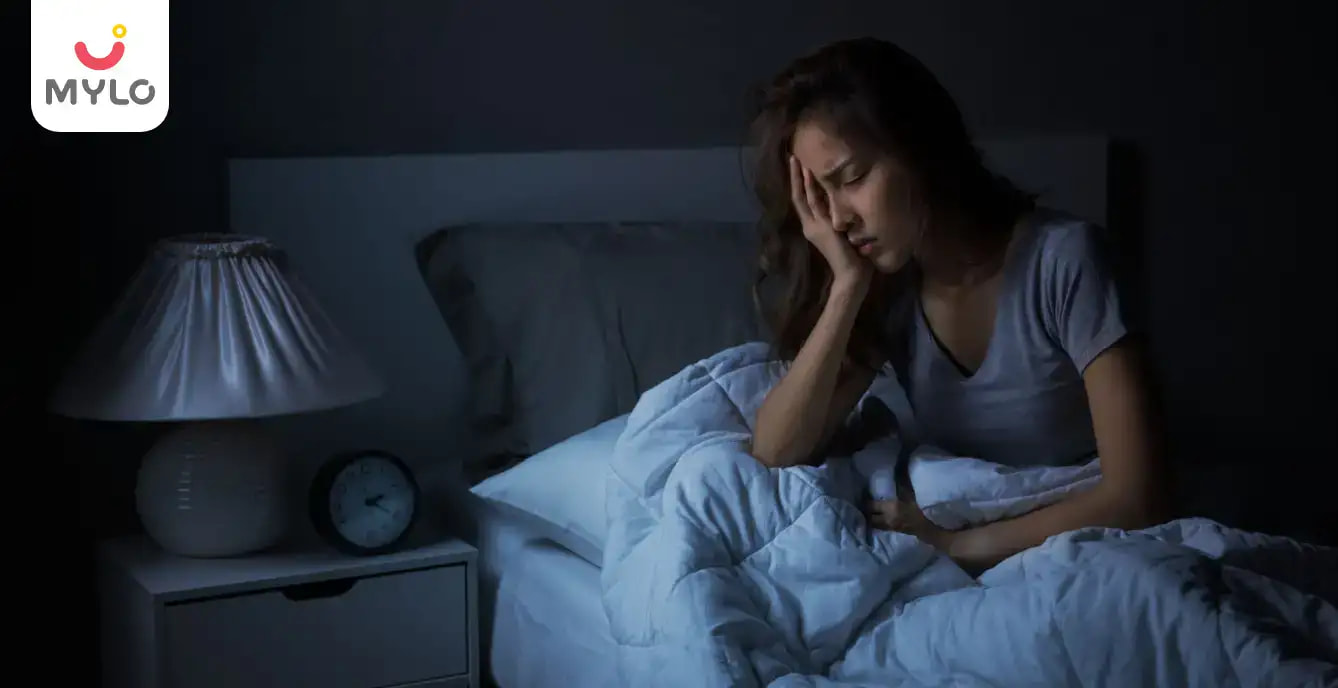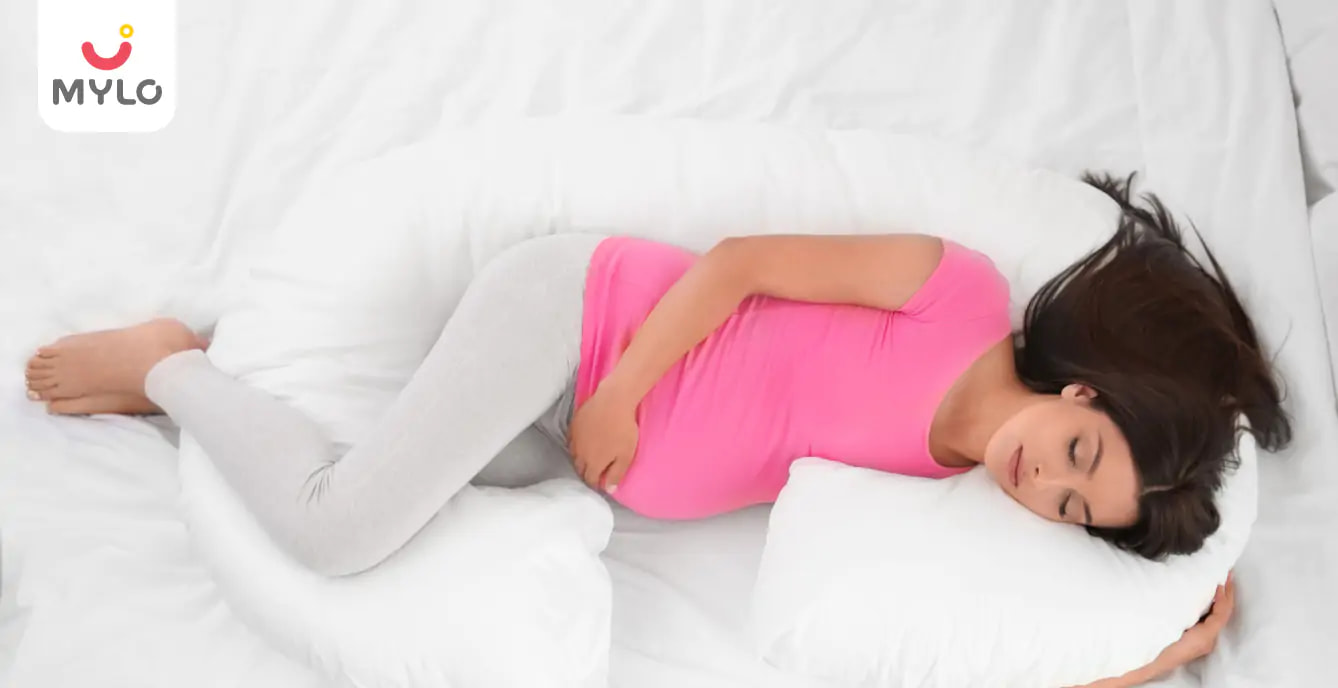Home

Postpartum Insomnia: Symptoms, Treatment & Tips For Relief
In this Article

Baby Care
Postpartum Insomnia: Symptoms, Treatment & Tips For Relief
Updated on 3 November 2023
Introduction
Having a baby is a joyous time, but it can also be a time of great sleep deprivation. For many new mothers, postpartum insomnia is a very real problem. If a woman is struggling to get enough rest, they are not alone. This blog post explores postpartum insomnia symptoms, treatments, and tips for the relief of postpartum insomnia.
What is postpartum insomnia?
Postpartum insomnia is a sleep disorder that can occur in the weeks or months following childbirth. It is characterized by difficulty falling asleep or staying asleep and can lead to daytime fatigue and other problems.
Causes of postpartum insomnia
There are many potential causes of postpartum insomnia, which can make it a difficult condition to treat. Some of the most common causes include:
Hormonal changes
After giving birth, a woman's hormones rapidly change to return to their pre-pregnancy state. These hormonal changes can cause disruptions in sleep patterns.
Anxiety and stress
Anxiety and stress are common during the postpartum period. They can be caused by a variety of factors, including adjusting to motherhood, lack of sleep, and worry about the baby.
Depression
Depression is another common cause of postpartum insomnia. It can be triggered by the hormonal changes that occur after childbirth, as well as by the new responsibilities of motherhood.
Pain
Pain from pregnancy or childbirth can also disrupt sleep patterns and lead to insomnia.
If a woman is struggling with postpartum insomnia, it's important to talk to the doctor about potential causes and treatment options.
Symptoms of postpartum insomnia
It's common for new moms to experience some level of insomnia in the first few weeks post-birth. But for some, this can become a more long-lasting problem. Here are some of the postpartum insomnia symptoms, as well as some possible treatments and tips for relief.
The most common symptom of postpartum insomnia is difficulty falling asleep. This can be due to several things, including anxiety about being a new parent, hormonal changes, and disruptions to the usual sleep routine. Once a new mother is finally able to fall asleep, they may find themselves waking up frequently throughout the night. This can be due to hunger, needing to use the restroom, or simply because they are not used to sleeping for longer periods.
If experiencing postpartum insomnia, a woman may also feel exhausted during the day. This can make it hard to concentrate on tasks or interact with the baby. They may also have trouble getting out of bed in the morning or feel like they need to take a nap during the day just to get through it.
Treatment for postpartum insomnia
Cognitive behavioural therapy (CBT) is a type of psychotherapy that helps people change their negative thinking and behaviour patterns. CBT is an effective treatment for many mental health conditions, including insomnia.
During CBT for postpartum insomnia, a therapist will help one identify and change the thoughts and behaviours that are keeping them from sleeping. The goal of CBT is to help develop healthy sleep habits and improve overall sleep quality.
CBT typically includes education about sleep, relaxation training, and cognitive restructuring. Sleep education may include information about how sleep works, the importance of good sleep habits, and common sleep problems. Relaxation training may involve techniques such as progressive muscle relaxation or breath control.
Tips for relief of postpartum insomnia
Here are some tips for relief of postpartum insomnia:
1. Establish a regular sleep schedule. Try to go to bed and wake up at the same time each day, even on weekends. This will help regulate the body's natural sleep-wake cycle.
2. Create a calming bedtime routine. A few minutes before bed, winding down with a relaxation exercise or reading a book can help prepare your mind for sleep.
3. Limit screen time before bed. Avoid using electronic devices like phones, laptops, and TVs in the hours leading up to sleep as the blue light they emit can disrupt the natural circadian rhythm and make it harder to fall asleep.
4. Get up and move during the day. Exercise can help improve sleep quality by reducing stress levels and promoting better overall physical health. Just be sure to avoid working out too close to bedtime as it can have the opposite effect.
5. Consider taking a supplement. If a woman is still struggling to get enough rest, talking to their doctor about taking a natural supplement like melatonin can help promote sleepiness at night.
Conclusion
After reading this article, one should now be aware of the symptoms, treatments and tips for relief when it comes to postpartum insomnia. If one is struggling with insomnia after having a baby, know that they are not alone and some things can help. Be sure to talk to the doctor about various options and try out some of the tips from this article to see what works best.
Visit Mylo Family for more such educational guides on new mothers and infants.
You may also like:https://mylofamily.com/article/what-to-know-about-snacking-after-delivery-191047?



Written by
Madhavi Gupta
Dr. Madhavi Gupta is an accomplished Ayurvedic doctor specializing in Medical content writing with an experience of over 10 years.
Read MoreGet baby's diet chart, and growth tips

Related Articles
Related Questions
Hello frnds..still no pain...doctor said head fix nhi hua hai..bt vagina me pain hai aur back pain bhi... anyone having same issues??

Kon kon c chije aisi hai jo pregnancy mei gas acidity jalan karti hain... Koi btayega plz bcz mujhe aksar khane ke baad hi samagh aata hai ki is chij se gas acidity jalan ho gyi hai. Please share your knowledge

I am 13 week pregnancy. Anyone having Storione-xt tablet. It better to have morning or night ???

Hlo to be moms....i hv a query...in my 9.5 wk i feel body joint pain like in ankle, knee, wrist, shoulder, toes....pain intensity is high...i cnt sleep....what should i do pls help....cn i cosult my doc.

Influenza and boostrix injection kisiko laga hai kya 8 month pregnancy me and q lagta hai ye plz reply me

Related Topics
RECENTLY PUBLISHED ARTICLES
our most recent articles

Diet & Nutrition
গর্ভাবস্থায় আলুবোখরা: উপকারিতা ও ঝুঁকি | Prunes During Pregnancy: Benefits & Risks in Bengali

Diet & Nutrition
গর্ভাবস্থায় হিং | ঝুঁকি, সুবিধা এবং অন্যান্য চিকিৎসা | Hing During Pregnancy | Risks, Benefits & Other Treatments in Bengali

Women Specific Issues
স্তনের উপর সাদা দাগ: লক্ষণ, কারণ এবং চিকিৎসা | White Spots on Nipple: Causes, Symptoms, and Treatments in Bengali

Diet & Nutrition
গর্ভাবস্থায় পোহা: উপকারিতা, ধরণ এবং রেসিপি | Poha During Pregnancy: Benefits, Types & Recipes in Bengali

Diet & Nutrition
গর্ভাবস্থায় মাছ: উপকারিতা এবং ঝুঁকি | Fish In Pregnancy: Benefits and Risks in Bengali

Diet & Nutrition
গর্ভাবস্থায় রেড ওয়াইন: পার্শ্ব প্রতিক্রিয়া এবং নির্দেশিকা | Red Wine During Pregnancy: Side Effects & Guidelines in Bengali
- ইনার থাই চ্যাফিং: কারণ, উপসর্গ এবং চিকিৎসা | Inner Thigh Chafing: Causes, Symptoms & Treatment in Bengali
- গর্ভাবস্থায় ব্রাউন রাইস: উপকারিতা ও সতর্কতা | Brown Rice During Pregnancy: Benefits & Precautions in Bengali
- Velamentous Cord Insertion - Precautions, Results & Safety
- Unlock the Secret to Flawless Skin: 7 Must-Have Qualities in a Face Serum
- Unlock the Secret to Radiant Skin: How Vitamin C Serum Can Transform Your Complexion
- Gender No Bar: 10 Reasons Why Everyone Needs a Body Lotion
- Unlock the Secret to Radiant Skin How to Choose the Perfect Body Lotion for Your Skin Type
- Top 10 Reasons to Apply a Body Lotion After Every Bath
- Communication in Toddlers: Milestones & Activities
- How to Improve Vocabulary for Toddlers?
- A Comprehensive Guide to Understanding Placenta Accreta
- Vulvovaginitis in Toddlers Causes, Symptoms and Treatment
- A Comprehensive Guide to Understanding Cerebral Palsy in Children
- Bitter Taste in Mouth During Pregnancy: Understanding the Causes and Remedies


AWARDS AND RECOGNITION

Mylo wins Forbes D2C Disruptor award

Mylo wins The Economic Times Promising Brands 2022
AS SEEN IN
















- Mylo Care: Effective and science-backed personal care and wellness solutions for a joyful you.
- Mylo Baby: Science-backed, gentle and effective personal care & hygiene range for your little one.
- Mylo Community: Trusted and empathetic community of 10mn+ parents and experts.
Product Categories
baby carrier | baby soap | baby wipes | stretch marks cream | baby cream | baby shampoo | baby massage oil | baby hair oil | stretch marks oil | baby body wash | baby powder | baby lotion | diaper rash cream | newborn diapers | teether | baby kajal | baby diapers | cloth diapers |








